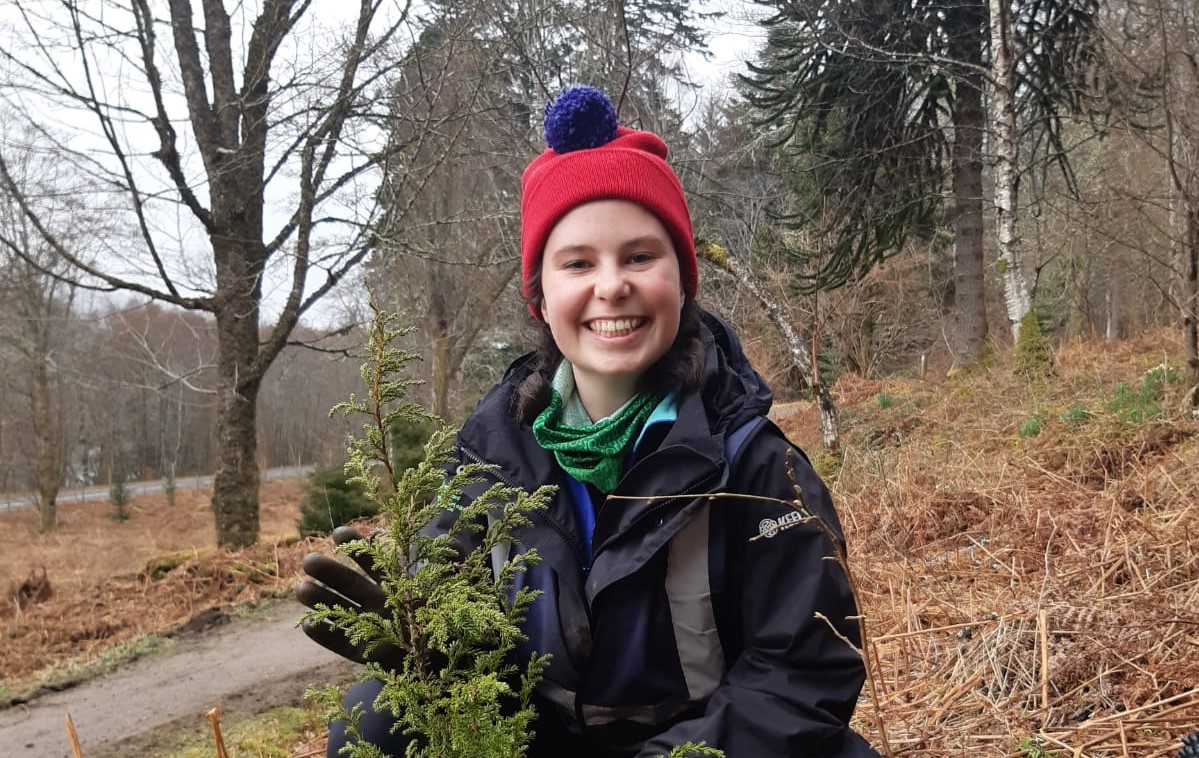

Rachel Orchard, 24, is originally from Wessex, and for the past year has worked with the Forestry and Land Scotland (FLS) team in Durris, Aberdeenshire, as a Trees and Timber Modern Apprentice.
“FLS manages the public estate for the joint objectives of sustainable timber production, environmental protection and public recreation. I am part of the craftspeople team, and we carry out practical tasks to keep our forests working effectively for their multiple purposes. For example, we carry out trail checks, fix gates and clear paths of dangerous trees and overgrown vegetation for the visitor services team. We put up goalposts and clear unwanted vegetation from forest roads to help the harvesting team. We take tree deliveries for the planting teams, plant trees ourselves and then carry out beat up surveys to see how many saplings have survived a year after planting.
In addition, we also have ongoing forest management tasks, for example, we are using clearing saws to respace a block of regenerated Silver Birch to allow the trees to grow larger and be of more use as commercial timber as firewood. My favourite task personally is removing tree tubes as it is satisfying and rewarding to remove the plastic from the landscape and free the trees from the tubes when they have outgrown them.
After school, I took a gap year to work and travel as I had no clue what to do next. I found out about Liberal Arts and Sciences degrees in the Netherlands, which are taught in English and allow you to pick and mix courses from humanities, sciences and social sciences. This suited me really well as I was curious about a range of topics, and over my three-year degree at University College Maastricht, I realised that my main interest was environmental studies, particularly how humans interact with their environment.
I finished my degree during the pandemic through online learning and quickly realised that I did not want a job in an office staring at a screen, so looked into outdoors-based industries. I was particularly drawn to forestry due to a long love of trees, enhanced by visiting national parks whilst on a semester abroad in Ecuador. During the early pandemic, my sister and I started clearing ivy off oaks and I joined the local countryside service to carry out hazel coppicing. This helped me realise that being in a wood was where I felt most happy and so was where I wanted to work.
I applied for the FLS apprenticeship after university as it seemed like the best possible option for someone with minimal outdoors-experience to gain practical skills through a paid job. Over the past year I have completed the SVQ level 5 in Trees and timber, which has helped structure my learning about carrying out forest management tasks. For example, I have been working towards my clearing saw, chipper and chainsaw tickets and gained confidence with a variety of hand tools. I look forward to starting the SVQ level 6 as this will go into more detail about how these management tasks fit into the wider picture of forestry as an industry.
After the apprenticeship, I am hoping to get a job as a craftsperson as I really enjoy the varied tasks and working within a team. In time, I would like to become a supervisor and a forest manager and perhaps be part of the planning or forest research teams at some point. I am really interested in restructuring our forests to enhance biodiversity balanced with sustainable timber production and creating space for nature connection experiences, especially given the challenges of climate change. For example, I want to look into continuous cover practices and better understand how using more mixed species planting improves soil health, and thereby, tree health.
From being inside studying in the homely comfort of southern England to being out in the wet and windy weather of north-east Scotland every day has required a fair amount of adjustment and re-defining what is ‘comfortable’ – with any temperature above 5 degrees now feeling balmy! Yet, the outdoors lifestyle of working in forestry has turned out to be everything I hoped for and I recommend it to anyone that will listen and certainly everyone that loves trees!”
Sarah works in Perthshire as a Forest Machine Operator - her job involves operating forwarders, harvesters and chainsaws. In this video, she tells us what she loves about her job working outside after leaving her previous career in engineering.

Simon works in the London Borough of Sutton, an outer London borough south of the River Thames. He started his career in a biochemistry research role for Brooke Bond tea, then decided to become a Tree Surgeon, working in this area for 27 years before moving to a Tree Officer role with Bromley Borough Council when he stayed for 5 years. After a brief period as a consultant with his own business, Simon returned to Tree Officer roles with local authorities, firstly with Wandsworth Borough Council and latterly with the London Borough of Sutton, as an Arboriculture & Woodlands Officer.
Simon works in a small core team of four Officers, responsible for managing trees within the borough in areas such a green parks and highways, and supervising tree maintenance and tree planting contractors.
Acknowledging there is no such thing as a “typical day”, Simon identifies regular activities of his role as preparing surveys and carrying our site visits. “Much of the role is responding to enquiries and requests from different areas of the public, from residents to local councillors, as well as working with contractors to schedule their work. This requires good communications skills, being able to connect with different people – having previously ran my own firm, I’m comfortable speaking to a variety of people.”
“Being a small team, we’re kept busy all year – during the winter months, we’ll be planning and planting the new trees, after preparing for the task in the autumn. Spring through to autumn, we’ll be dealing with anything from trees damaged by high winds, managing ash dieback, and the falling leaves.”
“I gained my Level 4 qualification in Arboriculture from Merrist Wood College in Guildford, going back to studying which I really enjoyed. Before moving to work with the local councils, I worked for a while in private consultancy. I then achieved my Level 6 Diploma in Arboriculture from Tree Life, which was a great achievement as it was a tough course! As well as these qualifications, I’ve completed a lot of training courses in my career, from practical courses (previously known by their CS codes, now known by their qualification name) to training on working safely.”
“You develop a lot of skills in the workplace, learning from your peers and doing daily tasks. Having previous experience as a Tree Surgeon is a great grounding to becoming a Tree Officer – it gives you additional skills to help evaluate trees and helps when discussing work schedules with contractors.”
While there have been technological advances to support the industry, Simon is keen to point out that practical skills are still important to be able to survey and analyse trees. He said: “We use computers to collect information on the trees in a database, and there are tools such as microdrill which can be useful, but a lot of the role still relies on visual surveys and a good understanding of the trees themselves.”
Simon has some words of encouragement for anyone thinking of a career in the sector. “A great part of my job is getting the balance right for the trees – dealing with damaged trees that need to be removed, but also planting and planning for new trees where they will be best suited. People are becoming more interested in the importance of trees and how they contribute to sustainability and wellbeing. There are challenges to the job, but if you’re the right kind of person you’ll get on well in this evolving line of work.”
Kara is primarily a chainsaw operator and runs her own business. She is passionate about getting other women and diverse genders into the industry. Barbara combines her interest in conservation with her love of horses and works with many foresters to extract timber from woodlands.